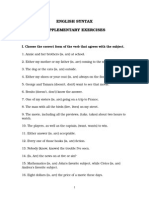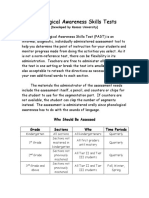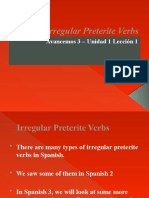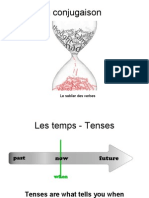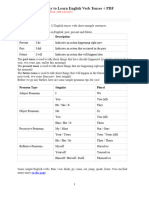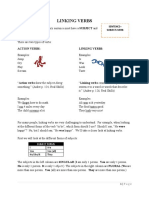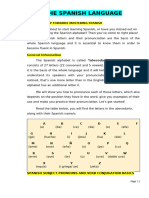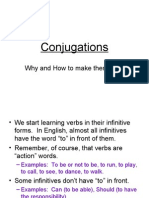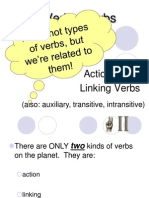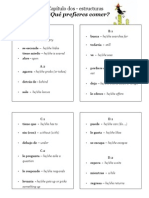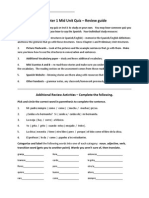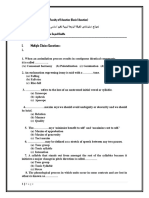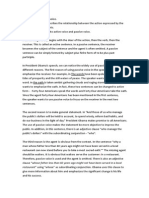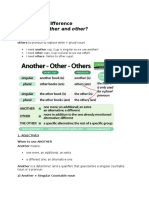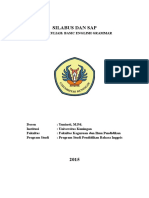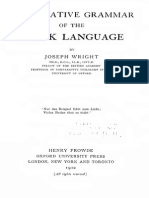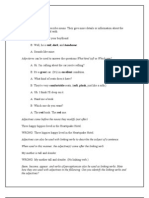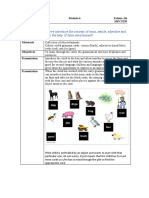Grammar Lesson 2 Verbs
Grammar Lesson 2 Verbs
Uploaded by
api-268368864Copyright:
Available Formats
Grammar Lesson 2 Verbs
Grammar Lesson 2 Verbs
Uploaded by
api-268368864Original Title
Copyright
Available Formats
Share this document
Did you find this document useful?
Is this content inappropriate?
Copyright:
Available Formats
Grammar Lesson 2 Verbs
Grammar Lesson 2 Verbs
Uploaded by
api-268368864Copyright:
Available Formats
La Gramatica
Lesson #2
Verb Conjugation
What is a verb?
Its an action word. Sometimes its not an
obvious action its a state of being. Some
examples of action words we have learned so
far in Spanish:
Obvious Actions Not Obvious
estoy I am
come escucha soy I am
llora dice es is
corre se re est - is
grita cuenta necesita
cuida viene tiene
vive quiere
Verbs are very important! Without them,
you do NOT have a sentence.
Because we are telling lots of stories which are
usually about other people, we started using
verbs only in the he/she form meaning
someone else is doing the action.
However, its not always someone else doing the
action.
Sometimes its you, I or even we or another
plural group doing the action.
So time to expand our conversation to include
others!
Verb Conjugation
The process of changing a verb to match WHO
is DOING the action is called conjugating a
verb.
This is a new idea in Spanish. Verbs are NOT
masculine or feminine like nouns. They also
do NOT become plural by adding an s.
The ending of the verb changes depending on
the subject who or what is doing the action.
Changing a verbs ending to match the subject
Every verb has a beginning or a title. We call
that the verbs infinitive or original form.
The original form of the verb helps us with
what the verb means, not who is doing the
action.
All verb infinitives will end with ar, er or
ir.
Examples:
necesitar (to need) escuchar (to listen)
correr (to run) comer (to eat)
vivir (to live) escribir (to write)
Verb Ending Patterns
Each type of verb follows an easy
to remember pattern for endings
Verbs ending in ar
Yo (I) -o
T (you) -as
l / Ella (he/she) -a (just drop the r)
Nosotros/as (we) -amos
Ellos/as (they) -an
Ustedes (all of you) -an
Lets see conjugating in action!
Escuchar = to listen
Yo escucho = I listen
T escuchas = you listen
l escucha = he listens
Ella escucha = she listens
Nosotros/as escuchamos = we listen
Ellos/as escuchan = they listen
Ustedes escuchan = you all listen
Verbs ending in er
Yo (I) -o
T (you) -es
l / Ella (he/she) -e (just drop the r)
Nosotros/as (we) -emos
Ellos/as (they) -en
Ustedes (all of you) -en
comer = to eat
Yo como = I eat
T comes = you eat
l come = he eats
Ella come = she eats
Nosotros/as comemos = we eat
Ellos/as comen = they eat
Ustedes comen = you all eat
Verbs ending in ir
this gets a little more tricky look carefully at endings
Yo (I) -o
T (you) -es
l / Ella (he/she) -e (drop the r, change I to e)
Nosotros/as (we) -imos (keep the I in)
Ellos/as (they) -en
Ustedes (all of you) -en
vivir = to live
Yo vivo = I live
T vives = you live
l vive = he lives
Ella vive = she lives
Nosotros/as vivimos = we live
Ellos/as viven = they live
Ustedes viven = you all live
Practicamos!
What do the following mean?
1. Los estudiantes necesitan papel.
2. Comes muchos dulces?
3. Corremos en la clase de educacion fisica.
4. Yo le grito a la oveja cuando no corre.
Put the following into Spanish:
The kids (nios) listen..
I tell jokes
We dont cry..
You might also like
- Kumon Table of Learning Materials (7A - 2A) PDFDocument4 pagesKumon Table of Learning Materials (7A - 2A) PDFfopoku2k267% (3)
- IB Spanish Review SheetsDocument22 pagesIB Spanish Review Sheetsharrisonackerman100% (12)
- ENGL 1010 Tarea 1.1Document4 pagesENGL 1010 Tarea 1.1Juan Calderon100% (6)
- Learn Spanish Verbs - 100 Most Common Spanish VerbsDocument1 pageLearn Spanish Verbs - 100 Most Common Spanish Verbs9sjhb9ws25No ratings yet
- ESL - English as a Second Language - Verbs: a QuickStudy Digital Reference GuideFrom EverandESL - English as a Second Language - Verbs: a QuickStudy Digital Reference GuideNo ratings yet
- Interchange Intro Level Scope and SequenceDocument4 pagesInterchange Intro Level Scope and SequencenaeemNo ratings yet
- Supplementary ExericsesDocument11 pagesSupplementary ExericsesMartina MartyNo ratings yet
- Phonological Awareness Skills TestsDocument19 pagesPhonological Awareness Skills Testsapi-475363881100% (1)
- Spanish Basics Lesson 2: Lo Básico de Español Lección 2Document6 pagesSpanish Basics Lesson 2: Lo Básico de Español Lección 2Rishav ChakrabartiNo ratings yet
- French NotesDocument9 pagesFrench NotesLuna DollyNo ratings yet
- Irregular Preterite Verbs Spa 3Document18 pagesIrregular Preterite Verbs Spa 3batmanNo ratings yet
- Spanish Module 2Document23 pagesSpanish Module 2Girish Gowtham DevatiNo ratings yet
- Spanish Grammar For English SpeakersDocument30 pagesSpanish Grammar For English Speakersbiffin100% (1)
- Draft Collaborative GR 33Document21 pagesDraft Collaborative GR 33jenniferNo ratings yet
- La ConjugaisonDocument17 pagesLa Conjugaisonpenhoat67% (3)
- Unit-I - 10.regular Verbs IIIDocument9 pagesUnit-I - 10.regular Verbs IIIbainisah.gandamatoNo ratings yet
- French 1st LessonDocument6 pagesFrench 1st Lessonalicia.berard.sNo ratings yet
- Bahasa Inggris Teknik ADocument17 pagesBahasa Inggris Teknik Ahanya downloadNo ratings yet
- The VerbDocument4 pagesThe VerbOnosa IulianaNo ratings yet
- VerbsDocument119 pagesVerbsDashbayar EmmyNo ratings yet
- Conjugation Rules 7th GradeDocument4 pagesConjugation Rules 7th GradeRitu AryanNo ratings yet
- Quick and Easy Way To Learn English Verb TensesDocument5 pagesQuick and Easy Way To Learn English Verb TensesIzem AtlasNo ratings yet
- Nhom 1 - Doc 1Document52 pagesNhom 1 - Doc 1phuongctNo ratings yet
- The Present Tense: Vosotros?Document4 pagesThe Present Tense: Vosotros?Alan OuyaNo ratings yet
- Spanish Grammar Rules: 7 Tricky Topics and How To Master ThemDocument11 pagesSpanish Grammar Rules: 7 Tricky Topics and How To Master ThemCora GalavísNo ratings yet
- Communicative English: Listen, Learn, ApplyDocument180 pagesCommunicative English: Listen, Learn, ApplySindhu Manja100% (1)
- UntitledDocument7 pagesUntitledEstevan MorducNo ratings yet
- Topic 6 - Past, Present and Future Tense in SpanishDocument19 pagesTopic 6 - Past, Present and Future Tense in SpanishYahiko100% (1)
- 8 Part of SpeechDocument36 pages8 Part of SpeechXeena HavenNo ratings yet
- Learn Spanish Fast - Verb Tenses - First EditionDocument90 pagesLearn Spanish Fast - Verb Tenses - First EditionSecond Language100% (2)
- The Two Verbal Aspects in SerbianDocument5 pagesThe Two Verbal Aspects in SerbianNikolinaNo ratings yet
- Division Demonstration Teaching On Subject Verb AgreementDocument32 pagesDivision Demonstration Teaching On Subject Verb AgreementJerome DizonNo ratings yet
- Repaso GeneralDocument24 pagesRepaso GeneralLuis Javier Bojorquez Medina100% (1)
- 4 - Simple Present TenseDocument17 pages4 - Simple Present TenseSyahrir IdNo ratings yet
- Intro To Linking VerbsDocument7 pagesIntro To Linking Verbshstein3No ratings yet
- методичка роздрукуватиDocument92 pagesметодичка роздрукуватиСвітлана Олегівна ЧастухінаNo ratings yet
- Verb To BeDocument11 pagesVerb To Bebrenda VázquezNo ratings yet
- French Grade 08 - BasicsDocument29 pagesFrench Grade 08 - BasicsCelina100% (2)
- Portafolio Beginners 2 Cristian y NayeliDocument18 pagesPortafolio Beginners 2 Cristian y NayeliCristian CabreraNo ratings yet
- Verb Tenses 1Document9 pagesVerb Tenses 1Erika Chango TapiaNo ratings yet
- Curs Italiana 2Document15 pagesCurs Italiana 2Elena ManciuNo ratings yet
- 1 1 Higher Present Tense Regular VerbsDocument21 pages1 1 Higher Present Tense Regular VerbsBinju SBNo ratings yet
- Form 2 Spanish - Present TenseDocument6 pagesForm 2 Spanish - Present TenseskylarNo ratings yet
- The Spanish LanguageDocument54 pagesThe Spanish LanguageBarangay CatoNo ratings yet
- Spanish Present TenseDocument5 pagesSpanish Present TenseJavier BelfonNo ratings yet
- French Grammar Tenses For English SpeakersDocument13 pagesFrench Grammar Tenses For English Speakersbiffin100% (2)
- Regular Verbs: Part I: NotesDocument6 pagesRegular Verbs: Part I: NotesHoJoJoNo ratings yet
- Ud1 Comunicacion Prof InglesDocument23 pagesUd1 Comunicacion Prof InglesAnonymous 3D8vtRNo ratings yet
- English Grammar 1: Learning Materials For The Course English LanguageDocument45 pagesEnglish Grammar 1: Learning Materials For The Course English LanguagepankajskecNo ratings yet
- Simple Present (Present Simple) : - IntroductionDocument23 pagesSimple Present (Present Simple) : - IntroductionSimona VinatoruNo ratings yet
- Ab General Conj. Span1Document8 pagesAb General Conj. Span1potaszNo ratings yet
- FrenchDocument10 pagesFrenchDivya JainNo ratings yet
- Presentation 1Document34 pagesPresentation 1errona.mesoNo ratings yet
- 000 - Unidad 1 - InglésDocument31 pages000 - Unidad 1 - InglésAnonymous 3D8vtRNo ratings yet
- We're N Ot Types of Verbs, But We're Re Lated To Them!Document44 pagesWe're N Ot Types of Verbs, But We're Re Lated To Them!Abdul HadiNo ratings yet
- Verbs, Verbs, Verbs: (Also: Auxiliary, Transitive, Intransitive)Document35 pagesVerbs, Verbs, Verbs: (Also: Auxiliary, Transitive, Intransitive)Elisha PaulNo ratings yet
- Grammar - Past Simple: Night/week/month/year, Yesterday, EtcDocument19 pagesGrammar - Past Simple: Night/week/month/year, Yesterday, EtcMiruna CarmenNo ratings yet
- Basic Sentence StructuresDocument20 pagesBasic Sentence StructuresCarla GarciaNo ratings yet
- Present Tenses: There Are 2 Basic Ways To Talk About PresentDocument13 pagesPresent Tenses: There Are 2 Basic Ways To Talk About PresentYujin IlNo ratings yet
- ConjugationsDocument8 pagesConjugationsoğuzhan oğuzhanNo ratings yet
- EnglishDocument9 pagesEnglishapi-354037574No ratings yet
- Bi Assgment TiehahDocument16 pagesBi Assgment TiehahFath TieyNo ratings yet
- Practice:: Change The Sentences Below Into QuestionsDocument11 pagesPractice:: Change The Sentences Below Into QuestionsYeison KiddNo ratings yet
- Verbs Main and HelpingDocument10 pagesVerbs Main and HelpingrkmanojsenapatiNo ratings yet
- Step 1Document31 pagesStep 1api-174052931No ratings yet
- Final Review Worksheet For Chapter 2 Test Answer KeyDocument3 pagesFinal Review Worksheet For Chapter 2 Test Answer Keyapi-268368864No ratings yet
- A TareaDocument2 pagesA Tareaapi-268368864No ratings yet
- Structures Cap 2Document1 pageStructures Cap 2api-268368864No ratings yet
- Mid Unit Quiz Review GuideDocument1 pageMid Unit Quiz Review Guideapi-268368864No ratings yet
- Grammar Lesson 1 Nouns and AdjectivesDocument6 pagesGrammar Lesson 1 Nouns and Adjectivesapi-268368864No ratings yet
- GMAT Verbal ReviewDocument61 pagesGMAT Verbal ReviewmonirjewelduNo ratings yet
- HandoutDocument3 pagesHandoutAnca TrancaNo ratings yet
- - نموذج استرشادي محادثة واستماع الفرقة الرابعة تعليم أساسي-د. وجدان خليفةDocument4 pages- نموذج استرشادي محادثة واستماع الفرقة الرابعة تعليم أساسي-د. وجدان خليفةAhmed AmerNo ratings yet
- Mood ExercisesDocument2 pagesMood ExercisesXiang LoongNo ratings yet
- INFINITIVDocument4 pagesINFINITIVhyde93No ratings yet
- Restaurant" Using "Whose" As Subordinating Conjunction. Obama Uses This Clause ToDocument2 pagesRestaurant" Using "Whose" As Subordinating Conjunction. Obama Uses This Clause ToVictor ChanNo ratings yet
- De Ning The WordDocument8 pagesDe Ning The Wordジョシュア ジョシュア100% (1)
- Comparative SDocument3 pagesComparative ShernandezlucyNo ratings yet
- Another Other The OtherDocument6 pagesAnother Other The OtherGabriela100% (1)
- Word StressDocument8 pagesWord StressSyamra Afiatni MulyaNo ratings yet
- Long Quiz in English 10Document2 pagesLong Quiz in English 10Maria JocosaNo ratings yet
- Silabus Dan Sap: Mata Kuliah: Basic English GrammarDocument10 pagesSilabus Dan Sap: Mata Kuliah: Basic English GrammarVinaNo ratings yet
- Wright Comparative Grammar of The Greek LanguageDocument406 pagesWright Comparative Grammar of The Greek Languagerabiaqiba100% (1)
- English Culture and SocietyDocument24 pagesEnglish Culture and SocietygemaNo ratings yet
- Pronunciation WorkshopDocument2 pagesPronunciation Workshoplilianeth201No ratings yet
- GrammerDocument42 pagesGrammerNitin ShaNo ratings yet
- Active and Passive VoiceDocument12 pagesActive and Passive VoiceOMGJodieBNo ratings yet
- Cheat Sheet Language Forms and Functions With Examples 1pageDocument2 pagesCheat Sheet Language Forms and Functions With Examples 1pagePaul100% (1)
- Compound Complex SentenceDocument4 pagesCompound Complex SentenceMauraNo ratings yet
- GrammarDocument45 pagesGrammaribelievemeNo ratings yet
- AVB Language SampleDocument2 pagesAVB Language SampleDiana BabeanuNo ratings yet
- A Contrastive Analysis of Agreement in Standard English and Standard Kurdish-2Document108 pagesA Contrastive Analysis of Agreement in Standard English and Standard Kurdish-2Hoshang SalaiyNo ratings yet
- Sanskrit Ref ManualDocument46 pagesSanskrit Ref Manualdearprasanta6015100% (1)
- Introduction To Noun, Adjective and ArticleDocument3 pagesIntroduction To Noun, Adjective and ArticleFatima Ali78% (9)
- Tuite Kartvelian PassivesDocument18 pagesTuite Kartvelian PassivesJim SchwanteNo ratings yet






